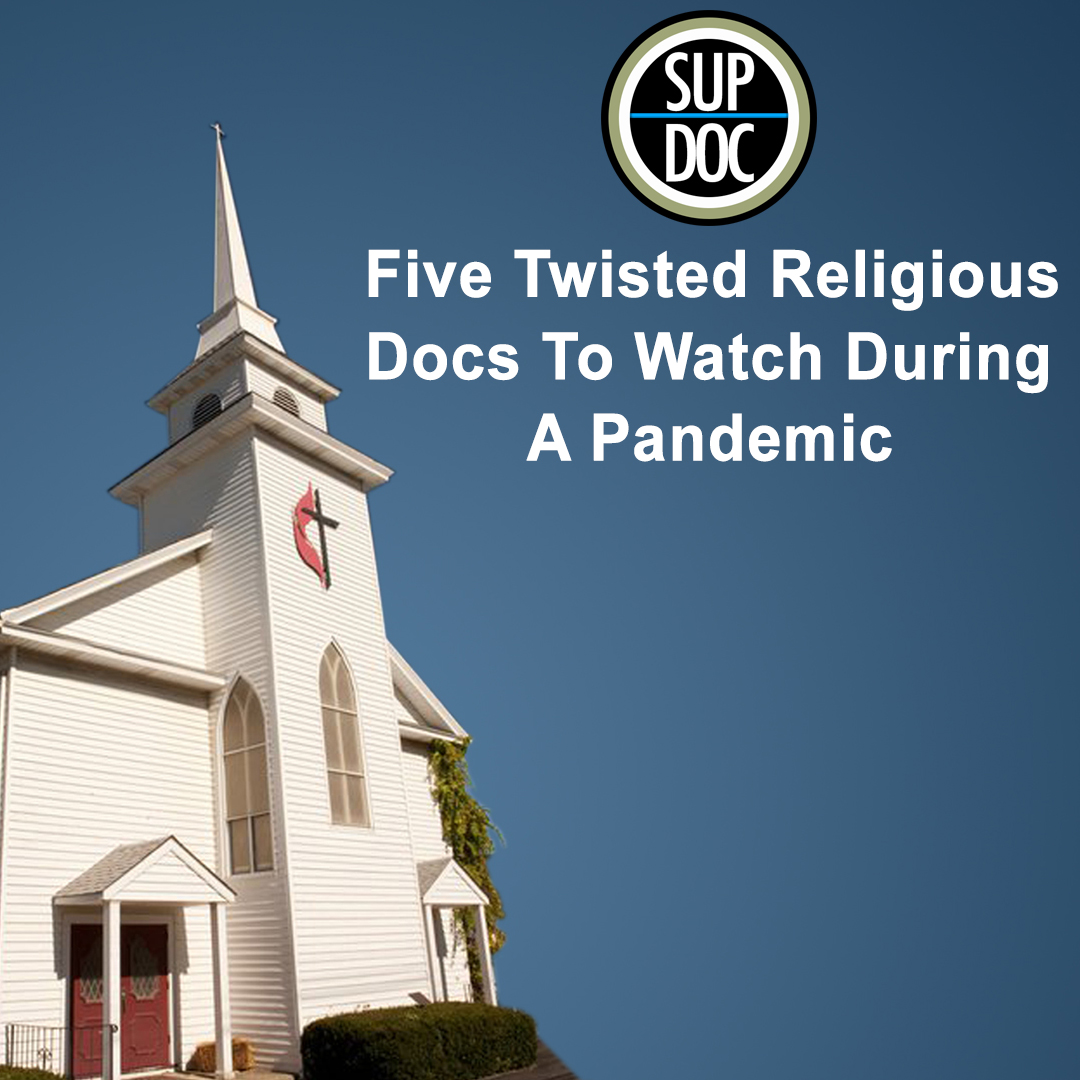Sup Doc The Premier Podcast About Documentaries
5 Twisted Religious Docs To Watch During A Pandemic
As the saying goes “there are no atheists in foxholes” so what better time to watch some great documentaries about religion and the end of times.
Jesus Camp
Filmmakers Heidi Ewing and Rachel Grady visit an evangelical Christian summer camp called Kids on Fire, where children take part in programs designed to strengthen and intensify their beliefs. The camp’s founder, Becky Fischer, discusses her mission to indoctrinate youths in the word of God, while young campers play certain combat video games and talk about their love for Jesus.
Streaming on YouTube // Google Play
Trailer Below:
Holy Hell
Holy Hell is a 2016 American documentary film by Will Allen about his experiences as a member of the Buddhafield cult for 22 years. The cult’s leader, who has several names but is typically called Michel, is claimed to have abused his followers. The film uses footage Allen shot during his capacity as the group’s videographer and new footage of interviews with former members and of the group in Hawaii. The film premiered on January 25, 2016 at the 2016 Sundance Film Festival and saw a limited theatrical release in May 2016. It was picked up for broadcast by CNN and aired on September 1, 2016. It was selected for competition at the Sundance Film Festival.
Streaming on Netflix // Amazon Prime
Trailer Below:
Marjoe
Marjoe is a 1972 American documentary film produced and directed by Howard Smith and Sarah Kernochan about the life of evangelist Marjoe Gortner. It won the 1972 Academy Award for Best Documentary Feature. Marjoe Gortner was a precocious child preacher with extraordinary talents, who was immensely popular in the American South. His parents earned large sums of money off of his earnings until the point he outgrew the novelty of his youthfulness. Gortner rejoined the ministry as a young adult solely as a means of earning a living, not as a believer. He spent the next several years using his fame and status as an evangelist to earn a living from both tent revivals and televangelism. Eventually, Gortner suffered a crisis of conscience and decided to give up the revival circuit. He offered a documentary film crew unrestricted access to him during his final revival tour, which took place in 1971. The film contains scenes from revival meetings showing Gortner preaching and praying for people in Los Angeles, Fort Worth, Detroit, and Anaheim. This is interspersed with footage of Gortner admitting on camera that he was a non-believer and revealing the tactics that he and other evangelists used to manipulate people and to move them during revivals. Some of the evangelists even revealed where they bought properties kept secret and gave him advice to follow. Gortner said he studied Mick Jagger of the Rolling Stones, as a model for his routine.
Here is a great VICE article written about Marjoe.
Streaming on iTunes // Amazon Prime
Trailer Below:
The Eyes Of Tammy Faye
The Eyes of Tammy Faye is a 2000 documentary film about the life of Tammy Faye Bakker directed by Fenton Bailey and narrated by RuPaul. RuPaul narrates this affectionate look at everyone’s favorite televangelist/living cosmetic display: Tammy Faye Bakker. The eldest of eight children in rural Minnesota, Tammy Faye married Jim Bakker in 1960, and soon they found a following on the gospel circuit. This eventually led to a gig on Christian media mogul Pat Robertson’s first television shows, including the ever-popular 700 Club. Perhaps jealous of their rising profile, Robertson soon usurped the show for himself. The Bakkers went on to co-found the Trinity Broadcasting Network, until that too was wrestled away from them by investors. Riding a tide of religious fundamentalism, the Bakkers reached their gaudy heights with the PTL Network and the spinoff Christian theme park Heritage USA. Then the roof caved in. Jim was forced to pay hush money to future Playboy centerfold model Jessica Hahn and then was submitted to rival Jerry Falwell’s hostile take-over of the network. Soon Jim was in jail for fraud, and Tammy was at Betty Ford for addiction to prescription drugs. This film was screened at the 2000 Sundance Film Festival.
Streaming on iTunes // Amazon Prime
Trailer Below:
Going Clear: Scientology and the Prison of Belief
Going Clear: Scientology and the Prison of Belief is a 2015 documentary film about Scientology. Directed by Alex Gibney and produced by HBO, it is based on Lawrence Wright‘s book Going Clear: Scientology, Hollywood and the Prison of Belief (2013). The film premiered at the 2015 Sundance Film Festival in Park City, Utah. It received widespread praise from critics and was nominated for seven Emmy Awards, winning three, including Best Documentary. It also received a 2015 Peabody Award and won the award for Best Documentary Screenplay from the Writers Guild of America.
The film deconstructs the church’s claims by presenting a condensed history of Scientology and its founder, L. Ron Hubbard, examining how celebrities interact with the church, and highlighting the stories of a number of ex-members and of the abuse and exploitation that they described seeing and experiencing. The Church of Scientology responded vehemently to the film, complaining to film critics about their reviews and denouncing the filmmakers and their interviewees.
Going Clear was released in a limited number of theaters on March 13, 2015, and aired on HBO on March 29, 2015. It was a major ratings success and by mid-April 2015 had attracted 5.5 million viewers, making it the second most-watched HBO documentary in the past decade. It was subsequently released internationally, showing in theaters and on television despite a sustained campaign by the Church of Scientology to block its release.
We explored this documentary with L Ron Hubbard’s great grandson Jamie DeWolf on Episode 16.
Streaming on YouTube // Amazon Prime
Trailer Below:














